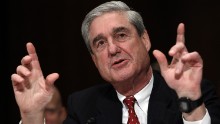- The President's legal team has been preparing for the expected request for months
- Trump's team is looking to how previous administrations have handled requests like this
begin quote from:
Trump team expects Mueller interview request
Starr: Mueller must look Trump in the eye
Trump lawyers anticipate Mueller interview request and want to limit its scope
Story highlights
Washington (CNN)Lawyers
for President Donald Trump are anticipating a request for the President
to talk to special counsel Robert Mueller and are discussing how to
define the parameters of any interview, according to sources with
knowledge of the matter.
The
President's legal team has been preparing for the expected request for
months. Trump's lawyers have said they are hoping for the investigation
to wrap up quickly.
However,
the sources insisted there have been no substantive talks or active
negotiations yet about a potential interview with the President. The
matter was broached in a previous meeting and both sides are expected to
explore it further in coming talks.
Trump's
team would like to structure any agreement for the President to be
interviewed by the special counsel. The President has expressed his
eagerness to bring an end to the investigation as quickly as possible,
according to one source with knowledge.
The
expectation is that Mueller's team would not wrap up the investigation
without an interview with the President, according to another source
with knowledge.
Trump's
team is looking to how previous administrations have handled requests
like this in the past as a basis for limiting the President's exposure:
whether he actually needs to testify under oath, whether he can provide
written answers to questions from Mueller's team and whether the
testimony should be recorded. Trump's attorneys don't want their client
to be interviewed by the special counsel's team on a fishing expedition,
according to one source with knowledge.
White House special counsel Ty Cobb stressed an overall willingness to cooperate with the Mueller investigation.
"For
the record the White House does not comment on communications with the
(Office of Special Counsel) out of respect for the OSC and its process.
The White House is continuing its full cooperation with the OSC in order
to facilitate the earliest possible resolution," Cobb said in a
statement.
A spokesman for Mueller's team declined to comment.
It
is unusual for a sitting president to speak directly to a special
counsel or independent prosecutor who is leading an investigation.
Previous presidents have sat down for a deposition in a civil suit.
One
exception came with Ken Starr's investigation during the Clinton
administration. In the summer of 1998, Starr's office subpoenaed
President Bill Clinton to testify before the grand jury. After several
days of negotiation between the President's lawyers and Starr's team,
the independent counsel withdrew the subpoena. Clinton testified from
the White House before the grand jury via closed-circuit television,
which was taped and later publicly released. He also gave interviews
under oath at the White House which were used as transcripts before the
grand jury.
During
the Iran-contra investigation in 1987, independent prosecutor Lawrence
Walsh reportedly weighed whether to interview President Ronald Reagan in
person or accept the President's written testimony. It was later
decided that Reagan would submit written answers to Walsh's questions.
Over
the weekend, Trump did not dismiss the idea of talking to Mueller's
team. When asked by a reporter if he would meet with Mueller, Trump
said, "yeah," and then said there has been no collusion and no crime,
and did not clarify his answer about a potential meeting.
In
June, Trump said he was "one hundred percent" willing to testify under
oath about his interactions with former FBI Director James Comey, which
could now be part of an obstruction of justice investigation.
Starr
said Monday that it's "probable" that Trump will need to meet with
Mueller before the special counsel can complete his investigation.
"(Mueller)
needs to, in order to round out, complete his investigation, to come to
a decision. He needs to look the President in the eye and ask the
appropriate questions," Starr told CNN.
Democratic Sen. Richard Blumenthal echoed Starr.
"Unquestionably
there has to be that kind of face-to-face interview," Blumenthal said,
on CNN earlier Monday. "The timing is important because the special
counsel needs to have as many facts and as much evidence before he has
that face-to-face interview with the President of the United States."
How
the President talks to prosecutors would be just as important. Starr
said that a meeting would likely be negotiated between the lawyers.
Because of the dignity of the presidency, it's less likely the special
counsel would subpoena a sitting president.
For
the most part, interviews in criminal investigations are voluntary.
Trump couldn't be forced to speak directly to Mueller or the FBI; he
could only be compelled to testify before a grand jury.
Trump's
lawyers could be present for an interview with Mueller's team. Grand
juries don't allow defense attorneys in the room during proceedings.
Trump
is no stranger to testifying in civil suits. In January 2017, while he
was President-elect, Trump gave an interview under oath as part of a
lawsuit between his company and chef Jose Andres, who pulled out of a
deal to open a restaurant in Trump's Washington hotel after Trump made
disparaging campaign trail comments about immigrants. The lawsuit ended
with a settlement, and the transcript is still confidential.






















No comments:
Post a Comment